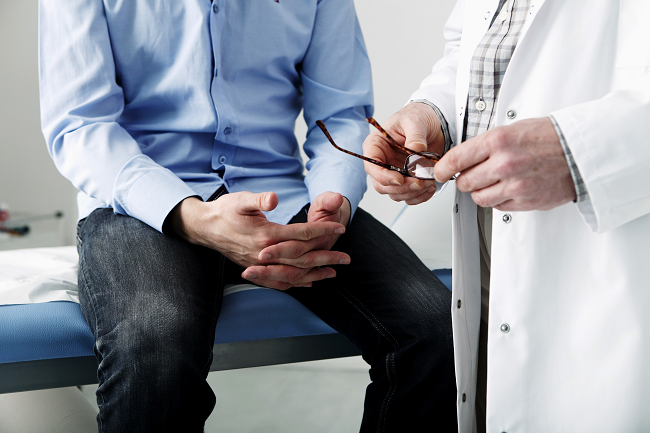Screening tests can find diseases earlier — when they are easier to treat. It’s well known that doctors recommend that men be aware of any changes on or to their bodies from moles to lumps to dry skin. Changes in appearance or texture can often be a symptom of an underlying condition. It is also recommended, that from puberty and beyond, men perform testicular self-exams to be easily alerted to any lumps and changes in size or tenderness.
Health experts from the U.S. Preventive Services Task Force have made recommendations for men, based on scientific evidence, about testing for the conditions below. Talk to your doctor about which ones apply to you and when and how often you should be tested.
Obesity: Have your body mass index (BMI) calculated to screen for obesity. BMI is a measure of body fat based on height and weight. You can also find your own BMI with the BMI calculator from the National Heart, Lung, and Blood Institute at: http://www.nhlbisupport.com/bmi/.
High cholesterol: Have your cholesterol checked regularly starting at 35. If you have diabetes or high blood pressure, smoke, or have family members with heart disease, your doctor may want to check your cholesterol sooner.
High blood pressure: Your blood pressure should be checked at least every 2 years. High blood pressure is 140/90 or higher.
Colorectal cancer: Testing for colorectal cancer should start at age 50. Your doctor can help you decide which colorectal cancer test/screening is right for you. If you have a family history of colorectal cancer, you may need to be screened earlier.
Prostate cancer: A prostate-specific antigen (PSA) test is usually encouraged for men between the ages of 55–75, and in those with an increased risk of prostate cancer. Your doctor may also choose to perform a digital rectal exam, depending on your PSA results.
Diabetes: Have a test for diabetes if you have high blood pressure or high cholesterol.
Depression: Your emotional health is as important as your physical health. If you have felt “down,” sad, or hopeless over the last two weeks or have felt little interest or pleasure in doing things, you may be depressed. Talk to your doctor about being screened for depression.
Sexually transmitted infections and HIV: Talk to your doctor to see if you should be tested for sexually transmitted infections. You may also need to be tested for HIV, especially if you had a blood transfusion between 1978 and 1985, are currently being treated for sexually transmitted diseases, or have had unprotected sex with partners who are HIV-infected or use injection drugs.
Abdominal aortic aneurysm: If you are between the ages of 65 and 75 and have ever smoked (100 or more cigarettes during your lifetime), you need to be screened once for abdominal aortic aneurysm, which is an abnormally large or swollen blood vessel in your abdomen.
For more information or to make an appointment with a specialist, call 423-778-2564, or visit www.erlanger.org.







